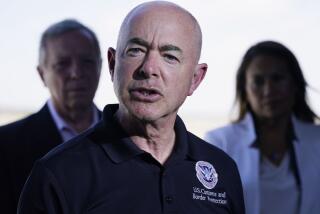California’s Inside Man at the White House
- Share via
WASHINGTON — As White House chief of staff, Leon E. Panetta is the President’s gatekeeper and all-purpose emissary. He tries to intercept all the cries and whispers that bombard the presidency and forge an agenda out of them. He seeks nothing less than to regulate the message that gets into the Oval Office and the message that gets out.
But this modern-day chamberlain also has Ansel Adams’ prints of the California coast on his office walls and Monterey memories in his head. And when his buddies from the California congressional delegation call, they get called back.
And when the topics are base closings, Border Patrol agents, smog checks or fairy shrimp, Panetta needs no tedious explanations to get him up to speed.
Base closing? Panetta witnessed the loss of Ft. Ord, the mammoth Army base in his former congressional district. Fairy shrimp designated an endangered species? Panetta knows that such federal declarations produce temblors of resentment among developers and farmers. Immigration? Panetta has seen the issue evolve in California from a beckoning of Mexican farm workers to widespread condemnation of them as the ruination of the state’s economy.
*
Does California have special pull in the West Wing of the White House?
“It’s like having one of your best friends in there,” said Pam Barry, the executive director of the California Democratic Congressional Delegation in Washington. “He’s been their peer for years. It’s like a mutual admiration society.”
When Panetta was named White House chief of staff in June, as replacement for Clinton’s best friend Thomas (Mack) McLarty, the 15-year denizen of Capitol Hill was seen as a widely respected nice guy who knew all the ugly truths about Congress and could salve the itchy relations between the executive and legislative branches.
“He knew how the digestive tract of Congress works,” said Rep. Jane Harman (D-Marina del Rey), employing a graphic but apt metaphor for the legislative process.
But perhaps most important, having Panetta in the inner sanctum gave California members of Congress that quintessential Washingtonian cachet: access.
“That’s the real key,” said Rep. Robert T. Matsui (D-Sacramento). “We had access under Mack, and this not a negative on Mack. But when we talk about the fairy shrimp as an endangered species Leon knows how that could be a problem for us.”
*
The Administration has long touted its special commitment to California, starting with numerous Californians in top jobs: Warren Christopher at State, Mickey Kantor as U.S. trade representative, Laura D’Andrea Tyson as chairwoman of the President’s economic advisers, Panetta as budget director.
Once Panetta ascended to chief of staff, he is largely credited with bringing in former California congressman and political sage Tony L. Coelho to reign temporarily as Democratic Party chieftain.
The overall effect is that tending to California issues is a fundamental White House mission. With the state’s enormous electoral power, there’s little chance the California focus will blur any time soon.
“Obviously, having Panetta as chief of staff brings even greater knowledge to bear on the state’s problems,” said Tom Epstein, White House political aide--and former deputy California insurance commissioner.
*
Having Panetta’s sympathetic and knowing ear is one thing, but does it yield any concrete results?
Epstein and others say yes and quickly point to key budget decisions made during Panetta’s 17 months as head of the Office of Management and Budget.
The Administration says that its fiscal 1995 budget has 32% more money than the last Bush budget for programs to help states with costs of legal and illegal immigration.
With pressure from Panetta (and angry governors), Congress budgeted--for the first time--$130 million (the White House wanted $350 million) to offset some of the states’ costs of incarcerating criminal illegal immigrants.
Would these decisions have been made if Panetta had not been enlisted by Clinton? Perhaps. But it’s clear that Panetta’s brainy but unpompous style played extremely well within Clinton’s inner circle, and that his California viewpoint quickly gained broad influence.
But this being Washington, Panetta must avoid the mistake of appearing too friendly toward his home state. After years of enduring anti-California tirades from House members from more serene states, Panetta knows the value of not crowing too loudly.
More to Read
Get the L.A. Times Politics newsletter
Deeply reported insights into legislation, politics and policy from Sacramento, Washington and beyond. In your inbox twice per week.
You may occasionally receive promotional content from the Los Angeles Times.









